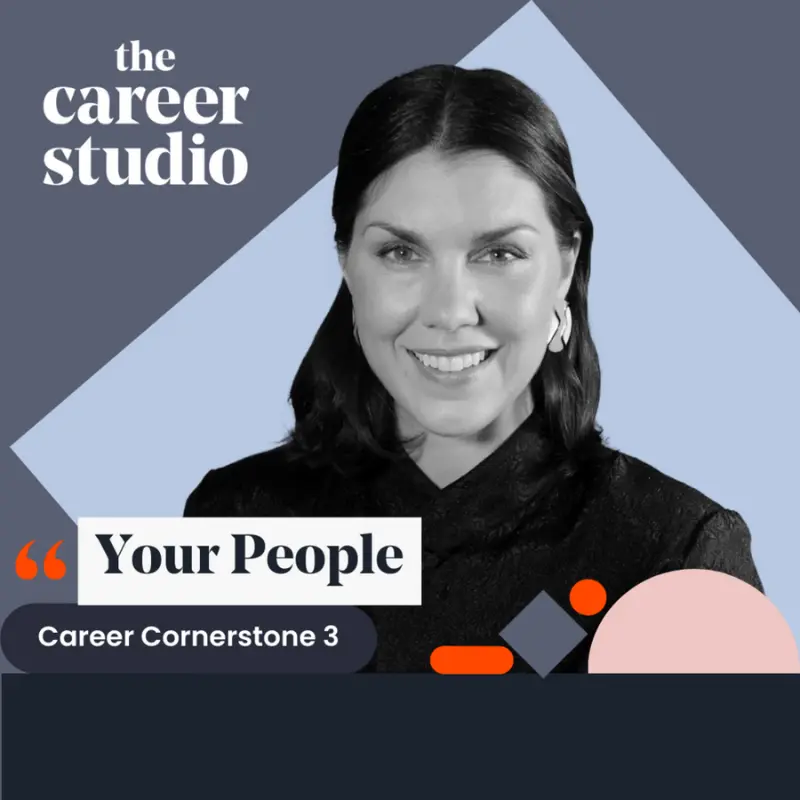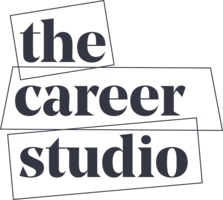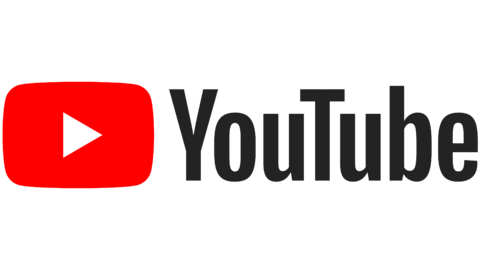Episode 3: Your People - Career Cornerstone 3

People are the lifeblood of your career. And what I mean by people is essentially learning how to have intentional, insightful, strategic conversations about whatever you need help with.
This is the skill will help you move through the inevitable discomfort of confusion and uncertainty that comes along with transitions. Learning how to have conversations will open doors, it will introduce new ideas you hadn't thought of before, and it will uncouple you from a reliance on job postings (which have an incredibly low success rate - only 2% are ever read by human eyes) and learning to have conversations will uncouple you from recruiters (whose interests aren't always aligned with yours). Talking to people creates the energy and momentum you need to create a career you love on your terms.
In this episode we’ll discuss why people tend to shy away from having conversations and how to reframe networking so it feels authentic and useful. We’ll discuss how to address the questions and concerns and fears you have about the half-baked ideas in your head. We dive into the importance of honesty and how it’s the critical ingredient in having effective conversations. And you’ll get a 4 step process that will help you generate a list of people to speak to right now and what to discuss with them.
You’ll learn in this episode
- What prevents you from having effective networking conversations
- How to have conversations that feel authentic and useful
- What to do immediately if you feel lost in your career
- How to use honesty to build genuine relationships while networking
Are you ready to create an energizing career you love?
You can create a career that is simply an extension of who you are and how you want to live your life. If this sounds like what you’re after then schedule a consultation. We'll get to the bottom of what's going on for you. And exactly where you need to focus to bring your career and life into alignment. It's free!
For more from The Career Studio
Follow me on LinkedIn!
Subscribe my once a week newsletter
Enjoy the show?
Don’t miss an episode by following The Career Studio on Spotify and subscribe via Apple Podcasts, Stitcher, or RSS.
Leave me a review on Apple Podcasts
Transcript
Welcome to the career studio podcast, where we boil down the noise and focus on the core concepts, essential for building an energizing career you love. One that is simply an extension of who you are and how you wanna live your life. Anyone can do it. It's just a matter of knowing what to focus on.
Hi, I'm Anne Benveniste. Career coach, and founder of the career studio.
Welcome to episode three. Today, we're gonna talk about the importance of leveraging people and conversations in your career. And as you may know, I'm starting off the podcast with an overview of the foundational components for creating an aligned, energizing, rewarding career. I call them the four cornerstones.
These are: your brand, your mindset, your people, your time. And the reason I created these is because there's a lot of noise out there. A lot of noise on how to navigate your career. So, when your work stops working and you don't know how to fix it, where do you start? Right. That can be very overwhelming. What do you pay attention to? What do you ignore? How do you navigate the confusion that you're experiencing with grace and intention instead of hiding and maintaining the status quo or panicking and making a hasty decision? That is the intention behind these four cornerstones.
Think of them like the cliff notes for your career. These are gonna be the most essential concepts to understand and apply. If you're gonna create an aligned energizing career you love, these are the areas that you need to address first, before everything else. They are the chapters in a playbook that you can come back to again and again, because inevitably who you are and what you want to evolve.
Right? So, this is all about a system that is repeatable that you have to learn once. Execute once. And then you can come back to, again and again. So, if you haven't already, I recommend going back and listening to the brand and the mindset episodes while each of these episodes can stand alone. These do provide a nice structure and foundation to a lot of what I'm gonna talk about today.
Okay. So, this is the foundational concept. Basically, people are the lifeblood of your career. You need them to thrive. And what I mean by people is essentially learning how to have intentional, insightful, strategic conversations about whatever you need help with. This is a skill that's gonna help you move through the inevitable discomfort of confusion and uncertainty that comes part and parcel with transitions.
Learning how to have conversations is going to open doors. It's going to introduce you to new ideas that you haven't thought of before. And it's gonna uncouple you from your reliance on job postings, which have an incredibly low success rate. The stat is that only 2% of applications to jobs posted online are ever read by human eyes. It's a pretty scary statistic. That's really not in your favor.
Learning how to have conversations is also gonna uncouple you, from recruiters. And recruiters are great, but their interests aren't always aligned with yours. So, talking to people creates the energy and the momentum you need to create a career you love on your terms. Right? But the thing is that most people shy away from having conversations because of three things. And I'll take you through these three things now.
So firstly, the reason people shy away from having conversations is cause they believe that successful in quotes, people, successful people are smart enough in quotes to figure things out for themselves. Right? It's like this idea that if I'm smart, if I'm capable, I should be able to figure this out for myself. I held this belief for years, an idea that asking for help is weak, or I should already have all the answers or if I was any good, I would know how to navigate this. And I wouldn't need to ask for help.
Right. I should be able to do it myself, which just results in us, single handily, forging our own paths through life. For example, when I decided I no longer wanted to be in advertising, but I wasn't sure what I wanted to do next. I didn't really talk to anyone about it. I just looked out into my community. I looked at my peers, I just made some assumptions about what I should do based on what other people were doing. I talked a lot about this in the last episode, but this led me to apply for an MBA without really considering if that was the best course of action for me, it's just where my brain with its pre-existing beliefs, some of them limiting. It's just where my brain went to as a solution. I didn't really explore it and talk to people about if that was the right decision for me. It was just my idea of the solution to my confusion. And sometimes just making a decision feels good, but then if it's not investigated, it could just be the wrong decision.
Okay. Cuz the thing is when you try and do everything yourself without asking people for help, you're limited. You're limited to your skills, your frame of reference, the patterns of thinking that your brain is used to, and this is great, but it's only gonna get you so far, right? You don't know what you don't know.
And if you're trying to shake things up and make big changes and get into places you've never been before, you're gonna have to do things differently than you've ever done before. And I think it's super typical, right? We look at people who have achieved fame or success in their careers, and we often only see the result of their journey.
We think that they were super clear on where they were going, or they were incredibly talented or incredibly lucky. But in reality, anyone who has achieved what they want, has asked for help along the way, lots and lots and lots of help. They've cultivated a team of mentors, advisors, teachers, coaches, around them to guide them to open doors.
Right. Think about any acceptance speech you've ever heard. People are thanking loads of people, right? No one gets there alone. You can also think about it like a big project at work. You would never single handily be asked to develop, test and launch a product into the market. You would instead assemble a team. And you wanna think about your career in the same way. If you're going to do everything by yourself, you're going to create only a fraction of the impact that would be possible, if you instead gathered a team around you..
So, what this really boils down to is that just asking for help isn't a sign of weakness, it's a sign of strength. It's a sign that you aren't passively floating along, but rather taking your life, taking your career by the reins and actively driving it in a direction that makes sense for you. I really like this quote from Obama when he was president, he said; "don't be afraid to ask questions, don't be afraid to ask for help when you need it. I do that every day, asking for help is not a sign of weakness. It's a sign of strength. It shows you have the courage to admit when you don't know something and to learn something new".
And if we think about it, the people who are most confident in themselves, they aren't afraid to ask questions because they're secure in who they are. And so, asking for questions doesn't mean that they are dumb or that they don't have their shit together. It's just, they're trying to figure stuff out. And on the flip side, people who try and project that they know everything and that they have it all together are usually trying to hide an insecurity or a fear. Right. So, if you really wanna project confidence, the way to do that is to ask questions. Plus, it's gonna feel easier because you're just gonna have to be telling the truth.
Okay. The second reason that people shy away from having conversations is because they believe it's not appropriate to ask people for a conversation. Right. This goes something like, "oh, I'll be wasting their time". Or" I can't ask for a conversation because I don't have anything to give in return". And obviously that perspective means you don't talk to people. You're gonna make decisions using your own frame of reference, whatever you can find on the internet, or you're gonna show up to the conversations you do organize as apologetic and a bit insecure.
You need to reframe this perspective. And what I always say to my clients is think about the last time you were stopped for directions on the street, right? You were probably happy to help if you could. And you felt good about sending them on their way clearer than when they stopped you. We are social creatures. We like being asked for help. We like offering our hard one wisdom. Right. As long as you make your request clear, respectful, personable, many people, including very senior people will offer you their time and advice. And you've probably already done this for people who are more junior than you, and you probably really enjoyed it because strokes are ego makes us feel good and valuable. Like we did things right.
And it's actually been studied, scientifically, that being generous really does make you happier. The study showed that if you were asked to spend a hundred dollars on someone else, the part of your brain associated with happiness was more activated and you reported feeling happier compared to the people who were asked to spend the hundred dollars on themselves.
I think this really makes sense. From an evolutionary perspective. We survived, we thrived as a species by working together in tribes, by dividing labor, by passing on wisdom. So, our brain gives us a positive reward in the package of positive feelings, when we do that. We are genetically predisposed to help each other. So, remember that. Ask people for their help and advice. If they have time, they will most likely say yes and they will feel good about doing it.
The third reason people shy away from having conversations is they feel like they don't know what to say. I often hear from people, "oh, I would talk to people, I'm not really that worried about that. It's just, I'm not sure what I'm asking". "I'm not ready to have the conversation". This is totally normal. We wanna be respectful of people's time. And we wanna ask them things that are gonna help us. But what I find most people don't realize is that there's this whole layer of networking required before you're actively looking for a job.
It's this layer that helps you figure out your direction. You're gonna need to explore some of the hypotheses you have and see; “do these ideas actually sound good in reality”? Do they live up to what I'm looking for? The best way to do this is to have investigative informational conversations. Conversations that help you figure out your questions. Everything that you're worried about right now, everything that you don't really know yet can only be figured out through having conversations and maybe some active practice, which again, would require conversations.
So having conversations is how you move through the uncertainty and the confusion that comes along with transition periods. So don't know if you have the right experience, gotta ask someone, don't know how much money you could actually make doing that thing. Gotta ask someone, worried that maybe you're only gonna be interested in part of the job, and the other part of the job's not gonna be that interesting. Gotta talk to someone about.
Think of yourself, like a detective putting pieces together, or like a scientist stress testing a hypothesis. And then once you've had enough conversations, you're gonna have enough data to identify a direction that feels exciting and feels like a good fit. Okay. And then you can switch the conversations about live opportunities. To do a project or to actually get a job in the spaces that interest you.
Okay. So, what I want you to take away from what I've just said is three things. One, the most successful people ask for help all the time. Two, people are genetically predisposed to enjoy helping others. Three, there is a whole layer of investigative networking that comes before asking about live opportunities. And it's this layer that helps you clarify all the questions you have in your mind right now.
Okay. So that's the core concept around people and some of the reframes I want you to take away, but now how do you actually go out and start doing things? If you're feeling like you want to evolve your career in some capacity? Here's how you start having conversations.
One, identify people doing things that interest you. They can be directly related or tangentially related. Who are they? Two, write down all your questions, your concerns, your fears about the career ideas you have. What is it like? Do I have applicable experience? What kind of additional experience might I need? What company should I explore? Can I make the money I want, what is the culture like. Three, talk to the people you identified and tell them your questions, your concerns, and your fears. Get their advice, get their insight on them.
Four, keep going until all of your questions, concerns and fears are answered, or you feel like you have enough data that you can make a decision about which path is right for you. And what's super important and required as part of this process is for you to be honest, right? So, notice in step two and three, write down all your questions, concerns, and fears, and then actually surface these to whomever you're speaking to. You can't hide and pretend like you have everything figured out. Otherwise, you're just not gonna get the information you need. You have to be honest about what you know, what you don't know, what you're trying to figure out.
Honesty is imperative. I'm not saying come to the conversation unprepared, but come prepared with your genuine, honest questions about what you need to know and how therefore they can help you answer your questions. This requires you to own who you are, your strengths, your interests, your priorities, and actually tell them to people. And the reason I stress honesty so much, the more honest you are, the better answers you're gonna get about the stuff you really need to know. The faster you're gonna recognize when something or someone isn't gonna fit with you.
And this is gonna allow you to move with more velocity. Into the spaces and with the people that are a better fit for you. Let's give an example, say you are the mother of a child under two, and you are pregnant with another baby on the way. And right now, you don't have the capacity to work in a high pressure, always on, nights and weekends kind of environment.
You're looking for a culture where people unplug at the end of the day. Where people respect the demands of parenthood. Where there's probably other people who are parents on the team or within the business. So, you wanna talk about how that kind of culture is important to you or probe the culture of the business as you're having these informational networking conversations.
Of course, talk about your interest in the job. What you're curious about in terms of the role or the industry, but also talk about the demands of your personal life. If this kind of thing is really important to you, then one of your questions in a networking conversation might sound like; "I'm about to be a mother of two. I know this is gonna be quite demanding. So, I'm really curious, what's the culture of the business like for parents. Are you a parent, have you had this kind of experience or are there other parents on the team that you could speak about". And you're gonna get exactly the information you need based on how they respond.
They relate to you if they empathize with you, that means they get it, right. If they talk about how the culture supports parents, you know, this is the type of place that could work. But if they're kind of frosty about it or weird about it, or they say, there's not that many people on the team who have kids, maybe that's not gonna be the best fit. But if you try and hide that part of yourself, you're not gonna get any of that information.
The other big reason to lead with honesty is because honesty is vulnerable. And vulnerability builds trust. And when you build trust with people, you build better relationships. This is gonna mean that your networking conversations don't feel transactional. Instead. They're gonna feel like two people coming together, getting to know each other, building a relationship.
So, this means that the people you talk to are more likely to wanna connect with you again. And are gonna wanna introduce you to other people because you've been vulnerable, and you've built a connection through that. So, let's continue with the example of motherhood. Let's say you ask that question, and the other person responds. "Yeah, actually I am a parent and I remember when I had two kids under three and it was very intense. I really understand what you're going through". And you guys talk about that for a bit. Maybe they will give you a few recommendations, et cetera. This is gonna create a genuine connection with someone. who gets you, cuz you guys share something in common and therefore this person is more likely to remember you, to relate to you than if you didn't have that part of the conversation.
So, look, I get it. Honesty might feel scary but know that it is the good kind of scary. It is the fast track to getting the information you need. Getting closer to the people that vibe with you and therefore ultimately creating the type of career that's possible for you to create, something that's energizing, something where you're excited every day to go into work. Something that feels like an extension of who you are and how you wanna spend your life.
So that's it, a bit of a shorter episode today, but have conversations with people. This is an essential cornerstone. This is an essential skill for building an aligned, energizing, fulfilling career. The most successful people in life are the ones that ask for help that cultivate mentors that assemble a team of experts around them. No one gets there alone, and you do not have to. Just like at work, you would never be expected to single handedly launch a product. You'd assemble a team of experts around you to compliment your own strengths and weaknesses and areas of expertise. So, treat your career in life with the same level of respect, you would give an important project you're running at work.
Ask for help. Call in experts, assemble a team. Ultimately you are going to go further and faster and to more interesting places, if you ask questions and get advice and support. Anyone can do this. It's just a matter of knowing what to focus on.
Hey, if you're ready to create an energizing career you loved one, that is simply an extension of who you are and how you want to live your life. Then I wanna invite you to schedule a consultation. We'll get to the bottom of what's going on for you. And exactly where you need to focus to bring your career and life into alignment. It's free. Just head on over to thecareer.studio/schedule to find a time that works for you, or if you're enjoying and getting value from these episodes, I'd love you to leave a short review on whatever podcast app you use.
This helps other people like you find and get value from the podcast too.



